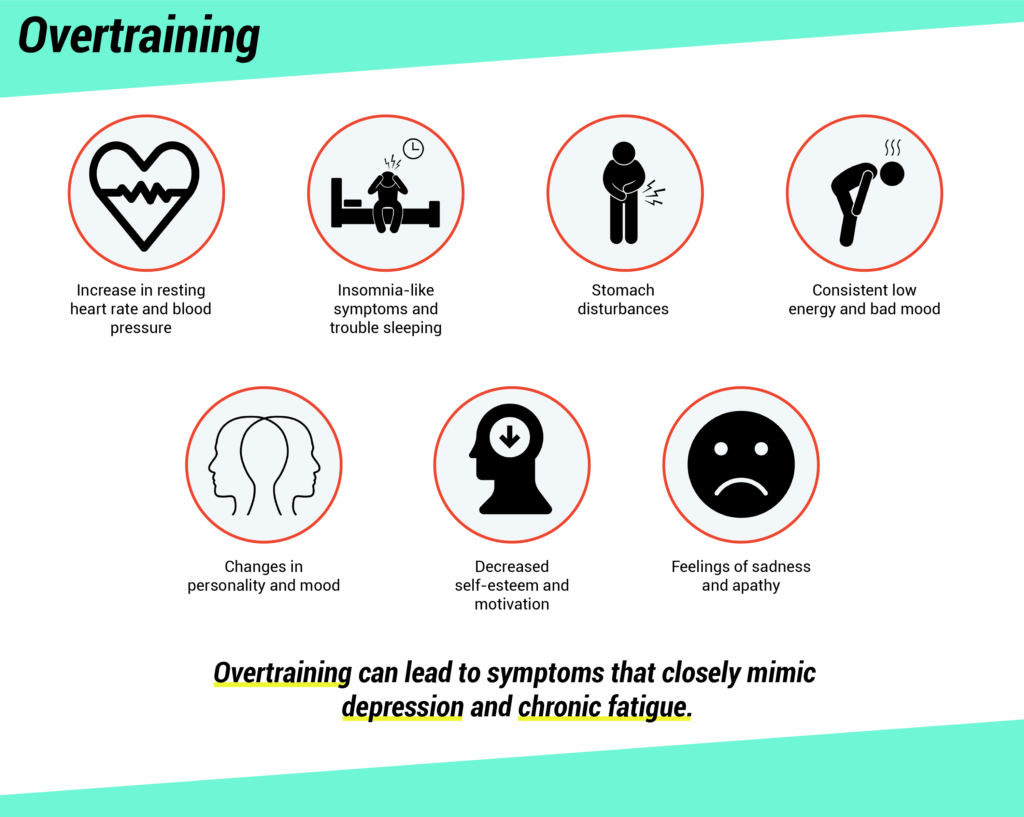How do you know if you are pushing too hard during your workouts?
Overtraining is a real phenomenon. It is possible to train so much that you break your body down rather than build it up. But most people never come close to “real” overtraining, which is highlighted (lowlighted?) by physical breakdowns that are hard to ignore. This isn’t muscle soreness or having some bad days in the gym.
Here are 7 common symptoms of overtraining, they include:
- Increase in resting heart rate and blood pressure
- Insomnia-like symptoms and trouble sleeping
- Stomach disturbances
- Consistent low energy and bad mood
- Changes in personality and mood
- Decreased self-esteem and motivation
- Feelings of sadness and apathy

In other words, you experience symptoms that closely mimic depression and chronic fatigue, according to research from the University of Memphis. In severe cases of overtraining, your immune system shuts down and you can suffer multiple issues, including upper respiratory infections and slow healing, says research published in the Journal of Athletic Training. You can read all about overtraining here.
Overwhelmed trying to figure out the right workout balance? Let our coaches help you.
While that article gives a great breakdown of how to set up your training, it doesn’t cover how you determine the fine line between intensity and insanity. So if you’re worried about pushing too hard, Mike Robertson has the answer. Mike (one of the top strength coaches in the U.S.) examines the different ways to evaluate the intensity of your workouts.
They can be broken down into a few options:
Option 1: A self-analysis technique known as RPR/RPE, or “rate of perceived recovery” and “rate of perceived exertion.” The RPR scale is how you feel coming into a training session — how well you slept, how tired/sore you feel, etc.
The RPE rates how heavy/how hard things feel once you start working out. And as you’ll see in Mike’s post, he evaluates it by regularly asking clients questions about how each move feels throughout the workout. Here’s an example:
-
- RPE of 10 – Max effort/limit lift. This is either one heckuva grinder, or they flat out miss a lift.
- RPE of 9 – Heavy lift, but one rep left in the tank.
- RPE of 8 – Heavy(ish) lift, but two reps left in the tank.
- RPE of 7 – Moderate weight, multiple reps left in the tank
Option 2: But let’s say you don’t trust yourself to make subjective measurements. You want data. Well, there are some tests you can use that will put some numbers to your physical preparedness.
For example, the vertical jump is a fairly accurate predictor of how fatigued you are (see study here). If your gym has one of those jump height sticks (y’know, these things), you can use that as a self-assessment tool. Jump before your workout/after your warm-up. If you are at, or above, your usual total, then you’re likely ready to go.
If you’re several inches below, then you’re more tired than you think and may want to scale the session back — or even make it an active recovery day.
Option 3: If you don’t like jumping, but still want data, no problem. A less obvious way to test your readiness is a simple hand dynamometer, which is a tool that measures hand strength. Studies show that hand strength is a reliable indicator of strength on a given day (example here).
And if you’re squeezing and squeezing but several points lower than usual, you’re more fatigued than you know.
How to make use of all of this?
When you get to the gym and start doing your “working sets” (not your warmup), stop and assess how you feel. The weight on the bar might be similar to prior workouts, but how you feel is likely different. And that is your body trying to give you helpful information to make the most of your session.
Instead of sticking to your exact plan, if the weight feels “heavier” than usual and you’re exhausted, you can still get in a great workout without grinding away unnecessarily. As you workout, this is the holy grail of feeling in control.
Push harder when your body says you can, and easy up when you know how to recognize that you’re a little overworked. It’s an approach that’s more likely to keep you consistently in the gym, feeling good, and making improvements.

Adam Bornstein is a New York Times bestselling author and the author of You Can’t Screw This Up. He is the founder of Born Fitness, and the co-founder of Arnold’s Pump Club (with Arnold Schwarzenegger) and Pen Name Consulting. An award-winning writer and editor, Bornstein was previously the Chief Nutrition Officer for Ladder, the Fitness and Nutrition editor for Men’s Health, Editorial Director at LIVESTRONG.com, and a columnist for SHAPE, Men’s Fitness, and Muscle & Fitness. He’s also a nutrition and fitness advisor for LeBron James, Cindy Crawford, Lindsey Vonn, and Arnold Schwarzenegger. According to The Huffington Post, Bornstein is “one of the most inspiring sources in all of health and fitness.” His work has been featured in dozens of publications, including The New York Times, Fast Company, ESPN, and GQ, and he’s appeared on Good Morning America, The Today Show, and E! News.
Thank you for sharing this great article. Stretching is my favorite after workout it helps the body to go further it’s limits and reduce the risk of injury, helps promote good blood flow to the body and can relieve stress. Also just try to know yourself better and love yourself better.
Excellent post. Thanks for sharing. Super useful information.
Thanks for reading!
Very interesting ways to check fatigue and assess the readiness for training. I have never heard of the RPR / RPE technique and the vertical jump test method. Indeed, I often have a feeling of depression, apathy, mood decline and insomnia. I always believed that it was my emotional instability, I attended a psychotherapist and took courses of treatment. But, it turns out, that the reason for this may be ordinary overtraining. I need to pay more time to rest, the right daytime planning and relaxation. Well, and of course – to check the level of fatigue using your methods)
Thanks for reading. Let us know if you give the RPR/RPE technique a try and how it goes.
Body building journey
Zottman curl
I like your Blog. It’s good for health so I hope this training might be helpful for fitness.
Great post! Moderating our exercise and work-out is very important for a healthy body.
Interesting article. Also share with my friends. Thank you for sharing.
Interesting that many of the symptoms of overtraining are quite serious and would be hard to diagnose. I can’t imagine that my doctor would even ask about my exercise regime if I presented some of these symptoms.
This is great information, I’ll keep this in mind when I am training. Thank you!
Overtraining is a subject that needs to be discussed with young guys starting gym who are pre pumped with social media and pre workouts shakes. This is dangerous as it can lead to injury and loss of gains.
I would also recommend creating a workout cycle . For example , athlete can put in 1 week of strong workouts , followed by week of recovery workouts which involves dynamic resistance band training and stretching.
Consistent training will bear strong lasting results and keep you healthy from inside out.
Regards
Team MGactivewear
Great insights! I’m also trying to switch to a healthier lifestyle and started to mine for healthy recipes like yours. Also, I started a marathon training with SportMe, and I managed to get rid of some pounds. Your blog posts are super inspiring for me in this phase, thanks!
Thanks for sharing, Mara.
Awesome post! Totally agree on the overtraining indications! Great things to look out for. It happens to us all from time to time 🙂
Thanks, Louis.
OMG! I’ve felt that way. But not in the gym but in some Power Yoga sessions. We used to do 101 Suryanamaskars in one go. It was meant to be done for 15 days straight. The First 3 days, it was fine. But after that, it was like a never-ending session. I gave up after 7 days.
And when I was not doing anything, I used to be too cranky.
I never thought I would feel like I am overtraining. But yeah most of these symptoms are visible in me. I am constantly trying to push myself more every day. Thank you 🙂
I think the best line in this article is in the first paragraph – “most people never come close to “real” overtraining”. Obviously you don’t want to hit your max deadlift 7 days a week, but the human body was built to work. Do you think the ancient greeks took an extra “rest day” because they still had a bit of soreness lingering?
Thanks for reading Todd.
Great tips. The last thing we want is to overtrain and get into an injury rehab journey…
Thanks Rui.
I sometimes feel stomach disturbances after a workout! I had no idea that was because of overtraining. Thank you for the article guys! Very informative
There may not be a direct correlation to overtraining as that is just one potential symptom. There could be other things impacting your stomach such as your diet and how close you are eating around your training. Make sure to consider all possible reasons. Thanks for reading Sumanth.
The biggest misconception in bodybuilding is that you can overtrain in ONE session! No, you CAN’T! Overtraining is coming in weeks and months. It’s a neurological thing.
I appreciate blog posts such as this one. Keep writing such detailed and informative blogs. Also can you please post about lower body workout?
Chris, we recommend checking out our Instagram page for a lot of lower body workouts https://instagram.com/bornfitness
There’s also this article for bands and lower body https://www.bornfitness.com/beginner-resistance-band-workout/
So guilty! I’m the worst about going all in on working out and then wonder why after a couple months I’m making no progress.
Very interesting article. Will there be more articles on this topic?
Wow excellent post. Thanks for sharing.